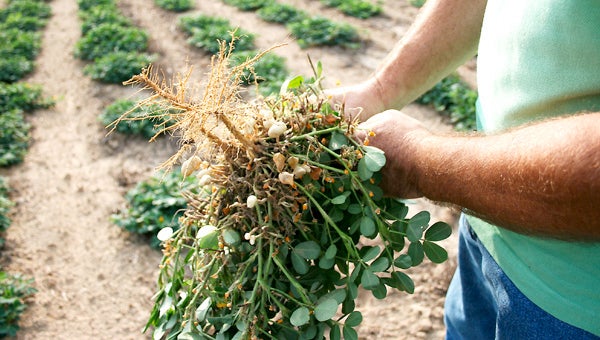Drought plagues peanuts
Published 11:00 pm Thursday, September 1, 2011

The drought conditions that have plagued farmers this growing season have taken a toll on the area's peanut crop. Withered blooms, burned pods and few undeveloped peanuts define this yearÕs peanut crop for many area farmers. (Photo/Jaine Treadwell)
Farmers having tough year with drought
This was supposed to be a good year for farmers.
Commodity prices were high and, with a little bit of luck, this year could have been the “better year next year” that farmers always seem to put their faith in.
But it wasn’t a good year. Mother Nature took care of that.
She withheld the rains and fields turned to dust, crops withered, creeks went dry and farmers could only wait, watch and pray.
Thursday morning, Pike County farmer Billy Hixon stood looking across the peanut field that had once held a lot of promise. Now, it’s history.
“Commodity prices were up this year but that won’t do you any good if you don’t make a crop,” said Hixon who farms with his dad, Bill Hixon, near Josie. “I planted peanuts in the dust in late May. They came up spotty and I replanted but they didn’t come up good either. We just didn’t get the rain we had to have to get the crop up.”
Rain came in spots and “good” rains were rare.
“It’s been a month now since we got any rain at all,” Hixon said. “The peanuts should have lapped in June and they still haven’t lapped. When you pull them up, there will be a few peanuts with nothing inside. The soil has been so hot the pods have burned up and the blooms have dried up. It would have been a good crop, if we’d gotten the rain.”
Hixon said that, if a good soaking rain came soon, the peanuts might try to make again but that’s doubtful.
“It just so dry that it would take an awful lot of rain to do any good,” he said. “My best hope is to bale the peanuts for hay.”
If Hixon’s peanut crop is history, it will be the second crop he has lost this growing season.
“I strip-till all my crops and, in the spring, I had to wait for rain to soften the ground,” he said. “We got .6 of an inch and I laid the rows and got planted. But the rain held off until mid-July so the corn crop was a total loss.”
But, like most farmers, Hixon has diversified his farming operation so all of his eggs won’t be in one basket. He has cows in the pastures and chickens in the broiler houses.
But the weather woes haven’t bypassed either of those “diversities.”
“Back before this latest drought, we’d gotten a good bit of rain from one Sunday to the next and the grass was growing,” Hixon said. “Then the rain stopped again and the cows caught up.
There’s not much grass for grazing and the pastures are in dire straits.
“We would normally have 700 or more bales of hay in the barns and we’ve got about 400 and, unless we get a lot of rain, we won’t have another cutting of hay,” Hixon said. “We usually get three to four cuttings and we’ve gotten one and a half.”
With the shortage of hay, Hixon said that he’s holding off weaning the claves until a decision is made as whether to sell or feed.
As the drought lingers, water could become an issue for livestock as creeks and streams dry up.
“I never thought that we would have a water shortage because we’ve got creeks and springs all over the farm,” Hixon said. “But then, everything is drying up and what pockets of water are left are stagnant. I’ve never seen it like this. Even the springs that feed the creeks aren’t doing any good. The ground soaks up the spring’s flow before it gets to the creek.”
With the corn and peanuts making history and the hay barns half bare, Hixon was looking to his poultry houses for encouragement.
For 54 days, he ran the fans and kept the water flowing and his birds survived the high temperatures and the high humidity.
“Then, in the last four days, I lost 7,000 birds,” Hixon said. “The high temperatures and humidity hit hard. And, what was so bad was that I lost the birds the last few days. If I’d lost them the first week or so, it wouldn’t have been so devastating. But I lost them after they had been fed and cooled for 50 days and were ready to be picked up. That was money out the door.”
Hixon said this growing season as been disheartening but farming is all that he has ever known and there’s enough farming in his blood that he believes that next year will be a better year.
“Farming gets in your blood,” he said. “It’s a way of life and you do it for the love of it. The good always outweighs the bad. Yeah, and even this year.”





